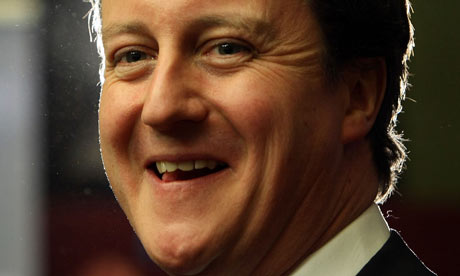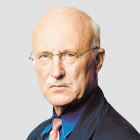2010 predictions: UKIP take Bucks
Friday, 1st January 2010
Political pundits are sharing a common prediction for 2010:
More
TV debates must include UKIP
Tuesday, 22nd December 2009
UKIP Leader Lord Pearson has called on all the major TV broadcasters
| European Issues | Leading Articles |
|
|
Ten reasons to leave the EU
Tuesday, 22nd December 2009
Here's Tory rebel Dan Hannan's list of 10 reasons why the UK
The year ahead: politics
Change is almost certainly coming in Westminster - what will the scene at Chequers be this time next year?

David Cameron may not have that much to laught about in 2010. Photograph: Christopher Furlong/Getty Images
David Cameron sunk into his favourite armchair by the fire and kicked off his slippers. "Our first Christmas in Chequers," he murmured contentedly as he realised that the phone hadn't disturbed the family for over an hour. Samantha had given instructions that he be left alone if possible, just for one day, and left alone he seemed to be. "We must be getting the hang of this prime minister lark," David told himself as he poured another finger of the Glenmorangie, to which Mrs Doubtfire, the Chequers housekeeper, had introduced him.
Out of the corner of one eye he could see Nancy and little Arthur tying up Gordon, Mrs Doubtfire's spayed tabby, using ribbons from the Christmas presents. He was a much nicer cat since they'd had him done, David thought. He closed the eye and pondered the extraordinary year now closing.
The general election, when it finally came on 6 May, had been much as he had hoped – and feared. The other Gordon – Gordon Brown – had found inner reserves of strength in the final months of the old government and put up a half-decent fight, allowing him to step down with dignity.
Labour's new leadership team, David Miliband and Jon Cruddas, were still finding their feet. They wouldn't be much trouble to the government for a while, not with leftwing MPs working with Ed Balls – narrowly defeated by Miliband – to pull the party off the centre-ground.
The controversy over public spending cuts and tax rises had been savage during the general election, but inconclusive. Voters had wanted someone to tackle the enormous burden of debt, the product of the banking crisis and the gaping hole that chancellor Brown had left in the budget. But they didn't want it done too quickly, while the country limped out of recession, or want their favourite public services cut in the process. And they certainly didn't want to pay extra taxes themselves. Let the rich pay, they said. But the rich had better accountants. David had always understood that, though it was not a point easily conveyed to a democratic electorate made angry by recession and disappointment.
In the end it was Europe, not the economy, that had most unsettled the Tory campaign. Party strategists felt the least said the better now that they had withdrawn their pledge of a refer endum on the Lisbon Treaty. But a determined core of Eurosceptics, led by the charismatic MEP Daniel Hannan, had refused to let go. The result was a polarised atmosphere with accusations of bad blood all round. Cameron drove to Buckingham Palace on the afternoon of 7 May with 342 seats to Labour's 208 and 66 for the Lib Dems, who had held up better than expected against the Tory onslaught in the south and taken a couple of seats in the north.
It meant an overall majority of 34, good enough (Margaret Thatcher won with 43 in 1979), but also confirmation of predictions that Cameron and George Osborne had failed to "seal the deal" conclusively with wary voters. Still, a small majority meant there would be fewer excessive expectations of the kind that had burdened Tony Blair in 1997.
The big difference was in the smaller parties. Ukip had snatched Speaker Bercow's seat in Buckingham (at least that solved the Bercow problem, David told himself) and one other. The BNP had got lucky in Stoke, as did the Green MEP Caroline Lucas in Brighton. In Belfast, Ian Paisley's DUP had been outflanked on the right. It meant trouble ahead there and in Scotland, where the SNP had notched up Commons seats – and votes – that Dave might need if his own restless right picked a fight over Europe or tax cuts which chancellor Osborne was reluctant to concede in the circumstances.
Everything had started well enough. Good spring weather, some credit for helping President Obama clinch the finer points of the climate change deal which had eluded Copenhagen. "Hey, if Blair could play footsie with Bush, I can cosy up to Obama," Dave told himself, just as little Arthur managed to topple the vase which had been a gift from President Hu Jintao.
But when Dubai finally defaulted big-time on its sovereign debts and was rashly not bailed out by its UAE neighbours, the credit agencies went into the usual collective panic and pulled the plug on Britain's triple-A credit rating. It was a danger that George had fought to avoid.
It was no consolation that the US itself suffered a humiliating downgrade too or that China's wilful refusal to revalue its currency and stop piling up export earnings was now endangering the global recovery. It was increasingly clear that Beijing no longer felt the need to listen.
So Britain had been plunged into a spending crisis like nothing since the last IMF bail-out in 1976. It didn't help that Dominique Strauss-Kahn, the IMF chief, was increasingly likely to resign in 2011 in order to go home and fight Nicolas Sarkozy (a pathetic sight since Carla Bruni – pictured right – ran off with Johnny Hallyday) for the French presidency. It was even rumoured that Gordon Brown, now teaching at Harvard, might get the IMF vacancy.
With hospital wards and school classrooms closing – and NHS waiting lists creeping up again – even nice David Miliband had been making political hay while simultaneously courting Nick Clegg with a view to jointly offering PR voting at Westminster at the next election.
If the Eurosceptic right kept making trouble, and the low-tax crowd (many of them the same people) kept pressing George for more cuts, that election might not be far off, David conceded. He had already suffered a cabinet resignation; not Dominic Grieve, the justice secretary, as his staff had predicted, but ambitious young Jeremy Hunt at culture.
David could hear Samantha calling the children, who were hiding pieces of broken vase under the sofa. At least England had won the World Cup under his premiership, he told himself. Fabio Capello had been as good as his word. Dominating Group C, the England squad got away with Wayne Rooney's winning "hand of God" goal against Brazil in the semi-finals and beat Germany 2-1 in Johannesburg on 11 July. Beckham's goal from the free kick, scored just after coming on for the last 10 minutes, was the stuff of legend.
And the whole family had been there. Even the devastating hurricane in Birmingham that brought him scurrying home had held off until the next morning. No, they couldn't take the World Cup away from him. But would this be their first and last Christmas in Chequers? David wasn't sure.


 EU laws cost £184bn by 2020 Open Europe has published a ‘Top 100 list’ of the most costly EU regulations introduced in the UK since 1998. Based on...
EU laws cost £184bn by 2020 Open Europe has published a ‘Top 100 list’ of the most costly EU regulations introduced in the UK since 1998. Based on... Your 2010 predictions We asked for your political predictions for 2010 and here are the best of the bunch submitted. George Cozens predicts: I think...
Your 2010 predictions We asked for your political predictions for 2010 and here are the best of the bunch submitted. George Cozens predicts: I think...




















